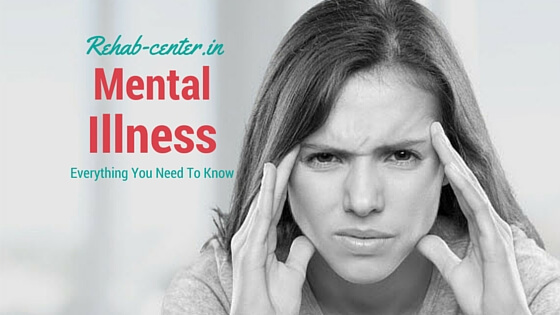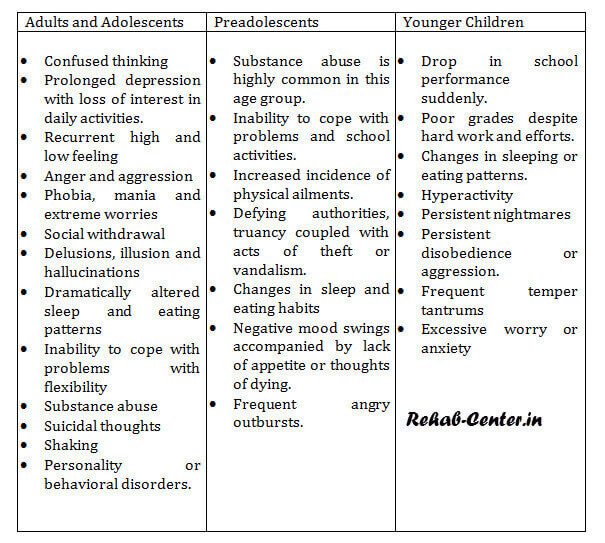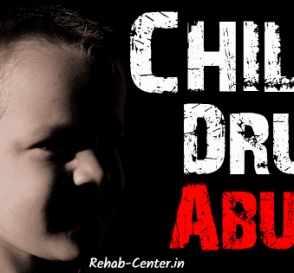Numerous studies have been done to understand the functioning of the brain. This helps to find out what went awry in any case of a mental illness. These illnesses can either present with stark signs and symptoms or very subtle warning signs, which need to be identified early on, before they take the proportions of a long-term illness. Mental disorders are not something that can’t or won’t happen to you. Succumbing to it under undue pressure and stress is highly common. So, understand what a mental illness is and be on the lookout for its symptoms in your near and dear ones.
What is Mental Health?
Mental health is our emotional and psychological well-being. It forms an important part in all stages of life, from childhood through adulthood. A positive mental health is crucial to function at full potential, cope with stressful periods, work productively and efficiently and make meaningful contributions to the society. The definition highlights the capacity to live a full and creative life and the flexibility to deal with inevitable changes as a sure shot sign of mental wellbeing.
It bestows a person with the ability to enjoy a satisfying life, create a balance between activities and efforts and achieve a satisfactory level of psychological resilience. In a world where almost 50% individuals are riddled with mental illnesses, working towards a positive mental health from early on is crucial. It can enhance the quality of life and increase vitality.

Mental Illness: A Brief Overview
Illness characterized by disorders of cognition, affect and behavior are grouped under the term of Mental illness or mental disorders. In other words, they impact intelligence, mood and behavior, resulting in impaired ability to cope with the ordinary demands of life. There are more than 200 mental illnesses that have been classified. The more disorders are clinical depression, bipolar disorders, changes in mood and personality, social withdrawal, substance abuse, schizophrenia, dementia and so on. Mental illness is widely prevalent and highly common.
Many mental illnesses are related to excessive stress due to a particular turn of events, situation or series of happenings that take their toll on the mind. Like physical illnesses, they may occur as a result of interactions between adverse environmental stresses, genetic factors or biochemical imbalances.
Telltale signs and symptoms of Mental Illness
Persons with mental illness exhibit a cluster of signs and symptoms rather than just one or two specific symptoms. They become an illness when the symptoms are persistent and interfere with day-to-day life. Studies show that mental illness patients are quite often victims of violent crimes. Different age groups may present with differing signs and symptoms. These are signs are generally so subtle that missing them is very common.
These are classified comprehensively under Diagnostic and Statistical Manual of Mental Illness (DSM-V).

What are the Treatment options?
• Active involvement: These are also known as Activity therapies or recreation therapies that promote mental healing through active engagement.
• Expressive therapies: A form of psychotherapy that involves expressing yourself and discovering your creativity through the various forms of art like music, drama, dance, poetry and art.
• Meditation: One of the most common traditional methods, which have been used for over several millennia to realign the body with the mind. Mindful meditation can help reduce stress, anxiety and depression. It can also treat substance abuse if done regularly. Research shows that going deeper into meditation on a regular basis is associated with favorable changes in the brain structure.
• Spiritual Counseling: In the era of antipsychotic drugs, this powerful method of curing mental illnesses is getting lost in the background. Spiritual counselors offer comfort and support to those in need and help to develop a better understanding of the world, develop a strong problem-solving relation with spirituality. This method works on spiritual, psychological and theological principles.
• Biofeedback: A process of gaining control over physical processes and brainwaves. Sounds freaky! But in reality, the brain has immense power to not just control the human body but also surrounding physical and metaphysical elements to some extent. It can be tapped into for these uses or simply to tune down anxiety and increase relaxation. This technique basically revolves around the fundamental of mind-over-body control.
• Group therapy: Includes a setting with multiple people involved, who interact with each other in the presence or absence of psychiatric counselors. It has various components viz. expressive therapy, support groups, problem solving and psychoeducation.
• Psychotherapy: scientific and evidence-based treatment of mental illness aligned with modern medicine. It includes psychoanalysis, cognitive and behavioral therapy.
• Taking time out: It helps to spend time with family and get away from the stressful environments. It reduces the incidence of frustration and anger and works as a miracle drug in mental illnesses.
Mental illnesses are very similar to any other physical illness. Peers and family members play an utmost important role in the care of the patient. Moreover, if you feel any of these symptoms, do not feel afraid. Find friends or close family members to vent out your feelings. Bottling them up is not the solution. By accepting your situation and trying to acquire help for the same, you have won half the battle. Even though it is highly stressful for families, peer support and family backing go a long way in helping patients.



